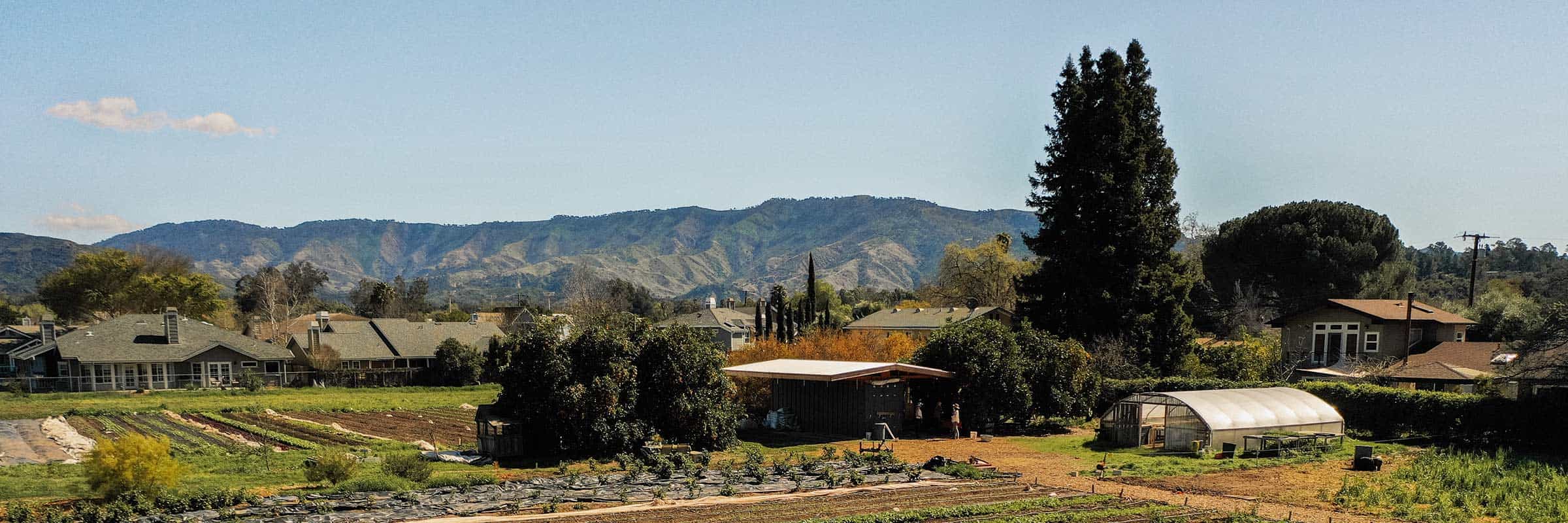Can agriculture save the planet? That’s what Patagonia believes. Patagonia is the out of doors firm that’s made battling local weather change their entrance line. Even their slogan states it: We’re in enterprise to save lots of the planet.
I definitely didn’t look forward to finding myself on a farm as much as my elbows in earth, gardening with the precursors to an agricultural revolution. My impression of California was extra of a spot ravaged by years of withering drought and wildfires, an ironic twist to the supposed cornucopia of America.
And but it’s in exactly this local weather that Patagonia is engaged on their new challenge: regenerative agriculture, an concept that has arguments which might be nothing if not persuasive. Earlier than recounting them, suffice it to say this challenge might change the destiny of our planet.
These Who Act—In another way
The Ventura solar beat down sizzling as we approached Patagonia’s seaside headquarters.
Duty will not be a phrase they take calmly at Patagonia. When Yvon Chouinard based the corporate in 1972, he was already on the eco-responsibility tip. Earlier than the clothes got here revolutionary climbing gear that didn’t scar or injury the rock surfaces it was used on. He known as it ‘Clear climbing’, the kind of foundational ethos that also drives the minds at Patagonia right now.
Local weather change began to develop into a family subject within the 90s, and Patagonia took an enormous gamble by going all-in on natural cotton. By 1996 they sourced solely natural cotton. “Some thought that was business-suicide,” defined Nicholas Ruiz from the Patagonia archives, “However we simply couldn’t hold working with all of the poisonous pesticides, poisoning the surroundings and the individuals who used them.”
Shoppers took to the brand new course. Austin McElvaney from advertising and marketing added, “We’ve at all times attracted a fairly conscientious clientele.” The corporate has tried to cut back their environmental footprint from the beginning, and nothing has modified.
“Natural isn’t sufficient.”
There may be far more to do, nevertheless. “Natural was an ideal step ahead, but it surely isn’t sufficient.” Cara Chacon, who runs the regenerative agriculture program at Patagonia, has boundless enthusiasm for the concept.
Each avant-garde and ancestral, regenerative agriculture limits working the land. It encourages the cultivation of a number of totally different sorts of crops that provide vital protecting biodiversity. Cowl crops add natural matter to the soil, amongst different advantages. These could also be historical methods, however with deeper data of how these assist our ecosystem, they’re extra necessary than ever.
Whereas natural farming eschews use of poisonous pesticides, Cara pushes it additional. “Regenerative agriculture lets us rebuild natural matter within the soil itself and to revive biodiversity, making farmland more healthy and offering higher yield. What’s extra, regenerated earth can sequester very important quantities of carbon.” A number of research on the subject recommend that regenerative agriculture would possibly simply be one of the best manner to attract Co2 out of the environment and reverse world warming.
“Our certification challenge, in partnership with the Regenerative Natural Certification, goes rather a lot additional than simply being natural. It stands on three pillars: soil well being, animal welfare and social equity for farmers. It goes a lot additional than simply being natural,” defined Cara.
She tells me that that is the brand new focus of Patagonia, with encouraging outcomes already seen in pilot initiatives within the US and India. For Cara, that is the long run resolution humanity has been in search of.
Encouraging Outcomes
We left Ventura and travelled to Ojai, 20 kilometers north, a small city nestled inside low-lying mountains and that feels timelessly serene. Right here we discovered the Metal Acres farm, a Patagonia companion that cultivates fruit and greens utilizing regenerative agriculture strategies. And Metal Acres was the place I’d get to see Regenerative Agriculture at work.
Emily Staalberg, proprietor and operator, sports activities a successful smile and dirt-caked palms. She defined that in three years her farm has boosted the natural matter within the soil by 2%—an enormous difference-maker on the earth of agriculture. Whether or not cotton or meals crops, outcomes are available in quick by way of soil well being and yield when regenerative agriculture is utilized.
To show the purpose she wins us over by way of our stomachs. Our healthful lunch of lentils, greens, salad and recent natural orange juice comes straight from the farm. We sit within the shade of orange timber, accompanied by rows of lettuce rising underneath the new solar. “The earth is resilient,” Emily tells me. “With regenerative agriculture strategies, we’ve given life again to degraded, worn-out soil.”
Mindset Evolution
Again at Patagonia HQ I meet Phil Graves, who runs Patagonia’s enterprise capital fund Tin Shed Ventures. He supervises Patagonia’s funding in third-party farms prepared to attempt regenerative agriculture. “We’ve been utilizing natural cotton for twenty years, however only one% of our business’s cotton is natural. It’s considered one of our largest failures—we weren’t in a position to encourage or persuade our friends (about natural cotton).”
Phil feels the environment is totally different now, each actually and figuratively. Farmers have been lashed by world warming, with forest fires scorching their fields and overly-warm winters ruining their harvests. “It’s a lot simpler now to persuade farmers to get fascinated with regenerative agriculture,” he affords.
Tin Shed Ventures invests in outfits that wish to attempt regenerative agriculture. The variety of firms which have approached them already numbers within the hundreds. Issues are altering, and individuals are in search of change.
In it Collectively
There may be an underlying irony to all this. Agriculture as we all know and observe it is without doubt one of the most environmentally polluting actions people undertake. That agriculture—albeit by way of a distinct methodology—additionally doubtlessly holds the important thing to reversing that injury and world warming is sort of the paradox.
Make merchandise that last more. Undertake a producing course of that’s useful to the planet. Persuade friends, opponents and shoppers to comply with go well with and undertake or insist on regenerative agriculture. It’s bold to say the least. “The very last thing we wish to do is to go it alone,” says Matt Dwyer, speaking in regards to the ROC Certification. In control of supplies and innovation at Patagonia, he represents the recent new wave of pondering responsibly on the firm. “We wish to go away the world higher than we discovered it—and in regenerative agriculture, we lastly have the software to do it with.”
|
Cotton In Conversion Prime Ladies’s Store |
Again Step Shirt Natural Cotton Males’s Store |
Can we Flip Again Time?
On my final night in California, I go away the Patagonia headquarters behind and make my strategy to the famed Surfer’s Level, a stretch of golden sand that fades into the space to the left and proper, nothing however the Pacific Ocean forward. Surfers within the water hunt down the right wave, not desirous about the truth that on the earth of tomorrow, pristine nature may be solely a reminiscence.
Assembly the change-driven individuals on my journey has introduced a breath of recent, optimistic air to counter the barrage of synthetic catastrophe information. It isn’t too late to save lots of the planet. Regenerative Agriculture, although a pilot challenge for now, does have the potential to reverse world warming. Patagonia, with their ethos of doing issues in a different way, understands. And can, or perhaps should, persuade their total business to comply with their lead.
It isn’t too late. However the clock is ticking.
Store Patagonia










